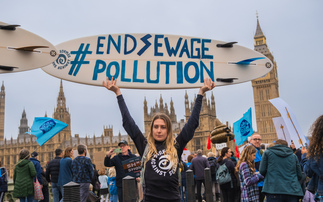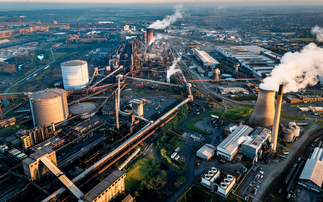The world's only two superpowers have confirmed the global economy is about to change beyond all recognition - businesses and investors have to respond
To understand the significance of today's news that the US and China have ratified the Paris Agreement it is important to cast your mind back 12 months to the build up to the UN's New York Climate Summit, which was intended to inject some much needed impetus into negotiations ahead of the Paris talks. No one attending that meeting, even the contagiously optimistic hosts Christiana Figueres and Ban Ki-moon, would have dared to dream we would be where we are now, just 12 months later.
A year ago there were signs an historic deal was in the offing, but there were equally credible fears the Paris Agreement would end up as a weak, meaningless fudge. Moreover, there were genuine concerns the whole process could collapse, delivering a Copenhagen Mark 2, only this time with no chance of the train being put back on the tracks.
In reality, the tense two weeks of talks ended up with a deal that was more ambitious than anyone expected, delivering a clear 'well below 2C' goal, a 1.5C ambition, and, crucially, a global commitment to build a net zero emission economy within the lifetime of today's children.
The deal was historic, and now that agreement has been ratified by the world's two only remaining superpowers, again, much faster than anyone expected. The two biggest and most influential economies are now fully committed to deep decarbonisation over the coming decades - the business opportunities that will come with this transition are enormous.
With India, Brazil and others signalling their intention to ratify the agreement sharpish the likelihood is the Paris Agreement will come into force before the end of the year, perhaps even before the US election and the end of the next UN climate summit in Marrakesh in November. There will no doubt be some hold outs, some setbacks along the way (President Trump, anyone?), but the vast majority of the world's governments are now committed to decarbonisation and convinced it can be delivered without compromising wider development goals. As Rudiger Dornbusch famously observed, "things take longer to happen than you think they will, and then they happen faster than you thought they could".
There are those who will continue to argue the voluntary nature of the Paris Agreement makes it toothless, an exercise in G20 virtue signalling. But this (often climate sceptic informed) criticism fails to appreciate the strength of the framework provided by the Paris Agreement. The deal may have been structured to ensure its legal footing offers countries a large degree of flexibility (in large part to ensure it did not need ratification from a Republican controlled Congress). But the process of asking countries to come forward with credible climate action plans will result in many of those nations translating their plans into legally-binding domestic legislation and investment plans.
More important still, the expectation every country will review these plans every five years means that as clean tech costs falls decarbonisation ambition will ratchet up. The approach is modelled on the UK Climate Change Act and as one official told me on the sidelines of the Paris Agreement it is the five year review part of the Act that ensures governments remain focused on climate action, not least because it is so difficult to deliver. The Paris Agreement is still inadequate given the enormity of the climate change threat and the daunting scale of the decarbonisation challenge, but the promise of five year reviews means we should not despair just yet.
Yes, much of this is voluntary. But it is voluntary in the way owning a smart phone is voluntary - everyone else has one and owning one delivers massive benefits and is pretty much essential to modern life. It is voluntary in the way holiday insurance is voluntary - you don't have to get it, but it is pretty reckless not to given the potential consequences. It is voluntary in the way the donation plate at church is voluntary - you don't have to put your hand in your pocket, but you know it is the right thing to do, and besides, everyone else is watching.
The reality is that voluntary or not, the US and China are now extremely unlikely to unwind their position on climate change or their support for the Paris Agreement.
Of course, a shock Donald Trump victory in November could herald a drastic scaling back of US climate ambition, but that risk only serves to highlight how the really significant development today is Chinese ratification of the deal. China will have factored in the risk of a Trump presidency and future US boycotts of UN climate summits, and decided to proceed anyway. The government has clearly decided decarbonisation is in its interests regardless of what happens in November and beyond - with the country's cities choking and the cost of clean energy plummeting this is hardly a surprising or illogical calculation.
For businesses and investors the signals being provided by the world's top economies should now be deafening. Yes, the low carbon transition will take time. Yes, barriers to decarbonisation will remain. Yes, some countries will renege on their commitments. But the vast majority are now committed to a fundamental reengineering of their economies away from fossil fuels and towards clean energy and infrastructure.
Policies and investment will inevitably follow; the resulting commercial opportunities will make the digital revolution look like a car boot sale, the resulting risks will make the financial crash look like a tea party. All business leaders and investors need to be aware that as more and more countries ratify the Paris Agreement the balance of risk for high and low carbon business plans tilts further in favour of the greener option.
The reality is that the world's most powerful governments are convinced that barring some form of staggering carbon capture or geoengineering breakthrough the fossil fuel age is entering its twilight years. The coal industry increasingly looks like a basket case and that is in a market where renewables undercutting of fossil fuels on cost is still not yet universal and the carbon price remains anaemic. If electric vehicles prove as disruptive as plenty of informed commentators expect the oil industry could go the same way. It is hard to overstate the scale of the industrial revolution that is coming, just as it is hard to overstate the benefits. As Lord Stern argues, the upside from this transition is unanswerable in the form of cities in which you can live and breathe and economies that are healthier and more resilient.
The climate impacts we will all still face could yet prove disastrous and delivering deep decarbonisation will prove supremely challenging, it is likely to take much of this century - but then again, sometimes progress happens much faster than you think.










